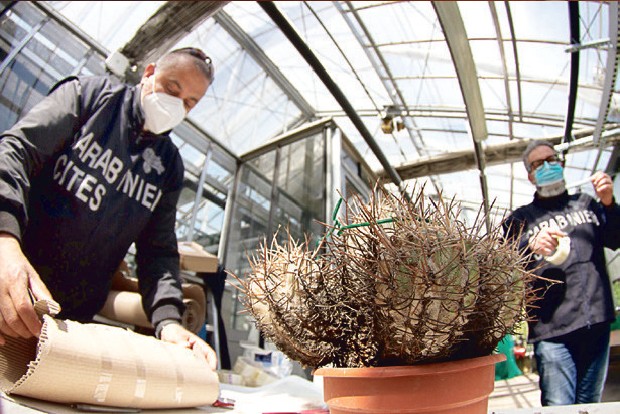Begin typing your search...
Global cactus traffickers cleaning out deserts
Andrea Cattabriga has seen a lot of cactuses where they didn’t belong. But he’d never seen anything like Operation Atacama, a bust carried out last year in Italy.

Chennai
A cactus expert and president of the Association for Biodiversity and Conservation, Cattabriga often helps the police identify the odd specimen seized from tourists or intercepted in the post. This time, however, Cattabriga was confronted by a stunning display: more than 1,000 of some of the world’s rarest cactuses, valued at over $1.2 mn on the black market.
Almost all of the protected plants had come from Chile, which does not legally export them, and some were well over a century old. The operation — which occurred in February 2020, but is being made public now because of the cactuses’ recent return to Chile — was most likely the biggest international cactus seizure in nearly three decades. It also highlights how much money traffickers may be earning from the trade. Seeing the collected cactuses brought a profound sadness to Cattabriga. “Here is an organism that has evolved over millions of years to be able to survive in the harshest conditions you can find on the planet, but that finishes its life in this way — just as an object to be sold,” he said.
As with the market for tiger bones, ivory, pangolin scales and rhino horn, a flourishing illegal global trade exists for plants. “Just about every plant you can probably think of is trafficked in some way,” said Eric Jumper, a special agent with the Fish and Wildlife Service. Cactuses and other succulents are among the most sought after, along with orchids and, increasingly, carnivorous species.
Trafficking can take a serious toll. Over 30 percent of the world’s nearly 1,500 cactus species are threatened with extinction. Unscrupulous collection is the primary driver of that decline, affecting almost half of imperilled species. Yet this realm of illegal trade is typically overlooked, a prime example of “plant blindness,” or the human tendency to broadly ignore this important branch on the tree of life. “The basic functioning of the planet would effectively grind to a halt without plants, but people care more about animals,” said Jared Margulies, a geographer at the University of Alabama who studies plant trafficking. “A lot of plant species are not receiving the amount of attention they would be if they had eyes and faces.”
Yet the size of Operation Atacama could be a notable exception. It is also the largest known example of cactuses stolen from the wild being repatriated for reintroduction into their native habitat. Experts also hope the case can be a turning point for how countries, collectors, conservationists and the industry deal with the thorny issue of international cactus trafficking. “Society as a whole can no longer continue to have a naïve view of this problem,” said Pablo Guerrero, a botanist at the University of Concepción in Chile.
Cactuses and other succulents are hot business today. They have become the darlings of social media, promoted by indoor plant influencers for their outlandish looks and minimal care requirements. The pandemic only increased their popularity, with shops struggling to keep some species in stock. Although no estimates exist for the scope of the illegal cactus trade, experts believe it is increasing. “It was a much smaller issue 20 years ago, but now, it is major,” said Jeff Pavlat, president of the Cactus and Succulent Society of America. “Entire populations are being stripped.”
Rachel Nuwer is a journalist with NYT©2021
Visit news.dtnext.in to explore our interactive epaper!
Download the DT Next app for more exciting features!
Click here for iOS
Click here for Android
Next Story



